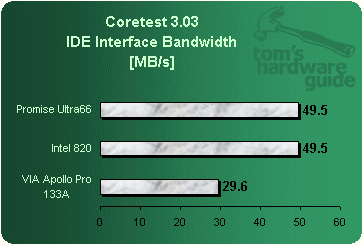Issues with VIA's Apollo Pro133A
B - Ultra DMA 66 And The Apollo Pro 133A
VIA is claiming support for ATA66 or UDMA66 since the release of the Apollo Pro Plus chipset and of course the Apollo Pro 133A is supposed to support this standard as well. This transfer standard for IDE hard drives offers up to 66 MB/s bandwidth via DMA (Direct Memory Access). It's also called 'Multi word DMA Mode 4'.
Unfortunately our tests revealed that this support exists only on paper. Measuring the maximum throughput from the hard disk cache to the system produced results that were only in the area of ATA33 or UDMA33, which offers a bandwidth of only up to 33 MB/s. There's currently no real world benchmark that would make any difference, mainly because even the fastest disks can only supply up to 30 MB/s from the physical media, but this might change very soon. Therefore I expect VIA to sort out this issue as soon as possible. We do not know if the problem is due to a driver issue, or if the actual chipset is unable to transport data fast enough, but we do know that motherboards do report 'Multi word DMA Mode 4' with the proper hard drives, alas without offering the expected throughput.
Intel's i810, i810E, 820 and i840 chipsets claim UDMA66-support as well and they are actually able to reach the expected throughput. Alternatively we tested with the Promise Ultra66 PCI card, which is usually used for systems that don't offer ATA66-support. This card produced the same results as the motherboards with Intel 8XX chipsets.
For benchmarking the maximum throughput I decided to use a nice and super old benchmark that most of you won't know anymore. 'Coretest' used to be a widely used hard drive performance benchmark some 10+ years ago. It's reading 64 kB blocks from the hard drive and does some seek time tests as well. Today it can only test how fast data can be retrieved out of the hard disk cache memory, but this is exactly what we want.
It's obvious that VIA's Apollo Pro 133A is not able to transfer data at ATA66 standard.
Get Tom's Hardware's best news and in-depth reviews, straight to your inbox.
Current page: B - Ultra DMA 66 And The Apollo Pro 133A
Prev Page Introduction Next Page C - VIA Apollo Pro 133A With CL3 PC133 SDRAM